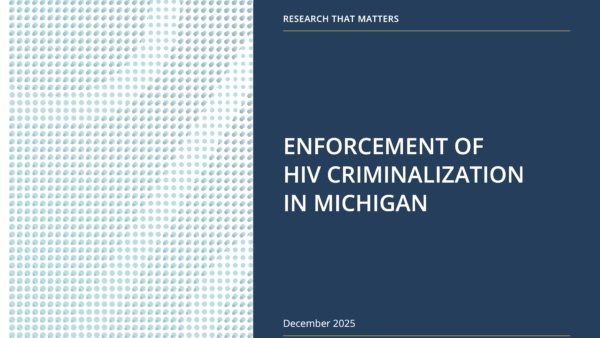Rob Olver interviews Edwin J. Bernard, Global coordinator of the HIV Justice Network, at “Rethinking Justice 2017 Symposium on HIV, Law and Human Rights”
One of the things that made the “Rethinking Justice: 2017 Symposium on HIV, Law and Human Rights” a “must-attend” for me was the presence of Edwin J. Bernard, Global Co-ordinator of the HIV Justice Network and foremost expert on HIV criminalization worldwide. PositiveLite.com had interviewed Edwin before and published him as well, but that was all the way back in 2012 and 2016 so I attended the symposium hoping for the chance of an interview.
I wasn’t disappointed. Edwin proved very gracious and willing to talk and towards the end of that very long day we sat down to get his take on how the HIV criminalization situation has evolved since we last spoke and where he thinks it might go, in Canada and globally.
******
So Edwin, thanks for taking the time to chat with us. I think the last time we interviewed was all the way back in 2012.
Right, I think it was. I think that when we talked in 2012 Canada was in a pretty bad place… or maybe it wasn’t, maybe it was before, I think it was before the Supreme Court handed down the Mabior decision and we’d been a little bit hopeful that perhaps they would look at the science… that they would have made a different decision than they actually did.
Yes, we were all expecting them to say that if a condom was used OR there was an undetectable viral load… and instead they said AND.
Yes, that was the very least they could have done.
And how do you see the progress that’s been made here in Canada since 2012? We’re looking at a different government now…
I don’t know if you know Elisabeth Kübler-Ross’s theory of the stages of grief. I came back after the Mabior decision in, I think, 2013 and there was, you know, anger and denial and depression … all of those things going on and I don’t think there ever was an acceptance that this was gong to be the legal standard for Canada.
But it’s taken a few years for there to be a resurgence of … figuring out how best to deal with it.
Today we’ve heard about all the different ways that Canada is at the forefront: the use of the sexual assault law and the disproportionate impact on racialized populations and on women and the fact that per capita it’s the highest number of prosecutions in the world and that the legal test is so unscientific that it’s non-disclosure and the risk of harm and not harm.
There’s a list of things that are so problematic. So of course a change in government has obviously helped tremendously. I’m very happy to hear that when Edwin Cameron, of the Constitutional Court of South Africa, when he spoke at the International AIDS conference in Durban, at our bidding highlighted the problem of Canada in particular in front of the Health Minister, who then called the Justice Minister and that led to the announcements today. And to me that’s amazing, that the federal government, that there’s a recognition that HIV is not a crime, it’s a public health issue. And to actually get to hear a government representative say that is a hell of a long way from where we were when I was here five years ago.
And the Legal Network and HALCO and COCQ SIDA and the community media, both PositiveLite and Xtra as well also did some amazing work. And the prosecutorial guidelines work, even though that didn’t lead to anything at the time.
One of the things I love about coming to Canada and particularly to Toronto is that this is where I get my inspiration, that there are so many brilliant advocates and activists with a wealth of knowledge and experience and despite Canada’s terrible reputation in terms of HIV criminalization or maybe because of it, the resilience of advocates and activists and the brilliance of mind. When I think about the work around guidance for nurses and health care workers .. that was world-leading.
There’s been so much amazing, world-leading work that’s been done here. The “Think Twice” campaigns that came from the grass roots, from AIDS Action Now … all of those things, to me, are so inspirational, that sometimes, even in the darkest times, it can actually inspire brilliance and so yeah – five years… but what a difference! It feels like we’re actually on the cusp of something brand new.
We certainly aren’t where we’d like to be but it seems like it’s all going somewhere now, after all those years of Tory rule.
Yeah and the other thing that I think is really special is the Canadian Coalition to Reform HIV Criminalization and Chad (Clarke) in particular. Chad reminded me that he had emailed me soon after he got out of prison. He said I was the first person he got in touch with, I guess because I was still blogging in those days and that I had put him touch with the Canadian HIV/AIDS Legal Network and those people and had led him on this path. And it’s so amazing to see now, how empowered he is, his courage and his strength and his leadership… it’s all so inspiring.
Yes it is. I know so many positive people who say that their lives are better now because of the way their situation brought them into focus and into this community. I feel that way myself.
I work on this issue all over the world and I think what’s interesting, what is special about HIV criminalization in Canada and how draconian the law is, is that once things are absolutely perfect in other ways, I mean there are still obviously issues, particularly around certain populations, undocumented migrants for instance, but in general things are pretty okay for people living with HIV, in terms of the medical side.
So it basically means that this is the thing, this is the thing you have to fight, have to work on. It’s the thing that’s most impacting your quality of life, your ability to feel… internalized stigma as well as discrimination and criminalization. So I completely get why this has been big in Canada.
I actually have to worry much more about my fellow human beings than about anything HIV is ever likely to do to me. So for me, the worst thing about living with HIV is other people… it’s not the virus. The virus is under control and I feel fine.
That’s like what Jean Paul Sartre’s play, Huis-clos (No Exit) said… “Hell is other people.” HIV stigma is other people. Yes.
You’re very active globally. How do you see Canada comparing with other countries at this point?
In my talk I was trying to situate where Canada sits globally and of course I did the… it’s very easy to do all the shaming and I’ve already listed all the different ways that Canada is a world leader in being problematic about criminalization. But I think that the announcements from the federal governmant, from Justice Canada, it actually sits very well in terms of where other countries with problematic provisions are rethinking criminaliation so … a number of states in the US have either modernized or are on their way toward modernizing their statutes. At the federal level there has been an attempt to pass a law for like the last six or seven years. It doesn’t ever get enough co-sponsors to be heard but there is a movement there in the US, even in the face of Trump and Trumpism.
Russia, in February of this year, their deputy minister for Social Affairs announced that they will be revising or removing their HIV-specific criminal law. And you know, the US and Russia have the highest numbers of criminal prosecutions in the world and then Canada’s third in terms of numbers.
But Canada is much higher per capita because you’ve got far fewer people with HIV than Russia or the US. So there’s a movement. Obviously there’s a grassroots movement and there’s a movement of civil society to push towards better laws or no laws at all around HIV. And Canada now is lookig like it could be part of the solution and not the problem that it’s been for so long. And it would be amazing if Canada could end up being a world leader in doing HIV justice rather than HIV criminalization.
U=U (undetectable = untransmittable) and the movement around it has been a game changer. There are other arguments for decriminalization or criminalization reform depending on how people want to come at it, but here in this country it’s certainly given advocates a greater palette to work from in their advocacy.
I helped Bruce (Richman)with putting the campaign together so in terms of the history, I wrote the English language news story about the Swiss Statement and covered it when I was a journalist and I’ve been pushing for many years to ensure that the criminal law is consistent with good science, not only around risk but also around the improved life expectancy, so the reduced harm of HIV and also the science of proof.
And I’ve done lots of work in that area. That’s what brought me to this work in the first place, was actually as a community-based journalist working on science. I wanted to bring the rationality to what felt like the irrationality of criminalization. So what Bruce and his colleagues have done with U=U is they’ve created a grassroots movement that’s popular.
And it’s taken far too long, you know – the Swiss Statement was in 2008. So Pietro Vernazza and I wrote a piece two years ago, looking at – I think it was called, “The Swiss Statement Seven Years Later”or eight years later… whenever it was. And he wrote about all of the studies, 052 and Partner had vindicated the Swiss statement of 2008. And I wrote about how it had impacted criminalization as well as stigma, both internalized and externalized stigma. And Bruce was inspired by that article to do the U=U campaign. So I have a huge amount of respect.
I think one of the problems has been, not the campaign itself, but the way that some groups and organizations and people living with HIV, rightly frustrated that many people do not have equitable lifetime access to treatment and are concerned about the medicalization of HIV above everything else.
And they sometimes want to kill the messenger. But the science is clear. If you’re on treatment, and it doesn’t even have to be undetectable because of course that’s a moving target. What is undetectable in one province is actually not in another, we’re discovering that. Alex McClellland’s talked about that.
So somebody who’s on treatment and adheres to it, whether or not they have access to viral load testing and whether or not that viral test shows undetectable or low levels, that person is extremely unlikely to pass on HIV to anyone and that’s fantastic and it’s something that we should celebrate.
It’s also a great advocacy tool to allow them to make sure that treatment and viral load testing are available to everyone who needs it, but that people shouldn’t be coerced into either knowing their status or taking treatment or to be afraid and to only take treatment because of criminalization.
But those are some of the more nuanced conversations that are going on about it, so in Canada of course it makes complete sense that the U=U message is welcomed and heard loud and clear because of the way that criminalization is framed around realistic possibility of transmission and the fact that the Supreme Court ignored the science in 2012.
So it makes complete sense to be focused on that. But there are a number of reasons why HIV criminalization shouldn’t be as problematic as it is in Canada and they’ve got nothing to do with science, but everything to do with human rights and equity.
The social determinants of health. HIV has been society’s way of condemning the sexually and behaviorally nonconformist. Any difference could be seized on and used against them.
In some ways HIV criminalization absolutely feeds into that and in some ways even the charges are often a surrogate marker of something else and it’s easier, it’s very easy to convict somebody for HIV non-disclosure.
It’s much harder to convict them of actual sexual assault or of domestic violence or of… it’s often due to a breakdown in a relationship and it’s just easier because there’s very little evidence that’s required to find someone guilty.
And the data that was shared this morning about how only three out of a thousand sexual assaults that are ever prosecuted result in a conviction, compared to probably 60 or 70 percent or probably even higher than that of all non-disclosure prosecutions being convicted.
And that’s also part of the problem, that HIV is not only a surrogate marker of being marginalized or stigmatized, but that criminalization is doing the same thing..
If I could ask you to just blue-sky for a moment, what do you think HIV criminalization is going to look like five years from now?
In Canada or globally?
Either one.
Well, it’s interesting that you ask about the five years because it’s five years since the Mabior decision, it’s five years since everyone was just devastated and it felt like it was pretty near the end of the world and you know, so much can happen in five years. We’ve got better science, science is behind us … the political will is behind us… even the fact that the Legal Network is part of our gobal movement, the HIV Justice Worldwide Coalition. It’s a global movement and they’ve played an incredibly important role.
So I would imagine as long as you continue to have the current political climate and there’s this coalition work, that in fiive years’ time I could well imagine that aggravated sexual assault will not be the law, will not be the charge. I can imagine that HIV non-disclosure, in and of itself may not end up being a thing that is prosecutable.
I would hope that there would be elements of mental, of mens rea, you know, that state of mind will be taken into consideration. The way it’s framed right now, you can’t even take state of mind into consideration. Whether that will be, as the global guidance recommends, malicious intent, or whether it will be more like a standard of recklessness, which is sort of a default standard and which is very much the same standard as in England and Wales.
And I would hope that it would be… whilst I really would hope, the ideal would be for there to be no criminal justice system interference in what is primarily a public health issue, I would imagine that the best-case scenario, as we’ve seen for example in the Netherlands.
I can imagine Canada being like the Netherlands. The Netherlands was the first country to do this, in 2005, through a number of Supreme Court rulings. Very different to your Supreme Court. It ended up in the situation they have now, where intentional exposure or transmission are the only things that can be prosecuted and there has only ever been one case since 2005. And I think that is probably the best case and I can imagine that happening.
Now, how it happens… there’s a lot to sort out. But if Canada could get from Mabior to here in five years then why not get to the point where only the very, very rare and difficult cases ever reach criminal court and that all the other cases are dealt with either by public health or through restorative justice or through community support. In five years, I think that’s quite, quite doable.
Sexual assault cases are difficult to even get to court, let alone prove and convict. If we contrast that with the startling success rate of HIV-related sexual assault cases and then factor n the racial stats for example, it paints a very strange picture.
Yes and I think that will be the sticking point in negotiations with the government and parliamentarians. When they discuss it, well that’s such a high legal standard, when I’ve talked with prosecutors, they’re like, “It is really hard to prove intent,” for example.
One would need to send a text afterward, saying, “Ha ha, welcome to the world of HIV.” Which has happened and if somebody was to produce an electronic paper trail to show state of mind, well, that would be used but that’s why potentially I think it’s possible that recklessness might be the compromise. We can prosecute reckless transmission or reckless exposure. And to be reckless, it’s slightly easier to prove but there’s a number of legal tests of recklessness, which means that you need to know your status, you need to know that HIV is transmitted by the way you’’ve behaved, you will have done nothing to prevent that. You will have no excuse as to why you didn’t disclose or use a condom.
So all of that. There’d be a whole load of those things to prove and then recklessness might be shown. But even then, they still need to prove transmission and that’s also very difficult. And I don’t know if you heard Art’s presentation on Phylogenetics but that’s also, there are huge limitations around that.
It’s not impossible; we’ve had reckless transmission in England and Wales. We’ve had 20 convictions in 15 years so it’s not like you can’t have them. It just means that there are a lot fewer of them.
I hadn’t been aware of that phylogenetic evidence is often misinterpreted.
That was actually how I got into doing this work. I was working for the U. K. equivalent of CATIE and we had our first prosecution in 2003.
And I was shocked and I didn’t know what to do about it, but I was writing about science. And the police actually contacted us and said, “We’ve got another case. Can you help us figure out how to prove that one person infected another?” And then I started looking at Phylogenetics.
And I realized that this was really complicated and that a tool which was really primarily used for public health was being misapplied in the criminal context as forensic evidence. I worked with a number of experts to produce a paper that Art referred to, in 2007, that for better or worse keeps being referred to as the paper that highlights the limitations of Phylogenetics in trying to prove that one person infected another.
And what is great about Phylogenetics and I think it should be used more often in criminal cases where transmission is alleged, because it can actually exonerate people. It can show that the viruses are not similar at all.
But when it shows that they are simlar, all it can say is that these viruses are similar and that’s consistent with the prosecutor’s arguments, but we need more evidence. You can’t just say, just because the Phylogenetic trees match, that cannot show direct transmission. There could always be other viruses in between, which means other people in between.
The complainant could have infected the defendant. Just because you’re diagnosed first doesn’t actually mean you were infected first. So all the other evidence needs to be brought in and so Phylogenetics alone cannot ever prove causation.
Can you direct me to that paper?
Sure, I’m the first author. It’s called “HIV Forensics”, so if you just search for E. J. Bernard HIV Forensics you’ll find it. And we did a second paper called “HIV Forensics 2”. That was produced by NAT, the National AIDS Trust. I was an author of that but we weren’t named for some reason. And that is also about this Recent Infection Testing Algorithm (RITA), which Public Health often does now, just to see if someone has been recently infected, compared to chronically infected.
And we did that to highlight that we were very concerned that these tests were being given back to newly diagnosed people to be told whether they had acquired HIV recently or not. We were concerned that someone who had been told that they had recently acquired HIV might thik that they could identify who had infected them, based on whether they had sex with them. And so we again highlighted that this is a public health tool that only suggests recency and it certainly can’t pinpoint timing.
That’s the thing about science. It can move forward and help us as it has with U=U, but it can move forward and create a number of problems if it’s misapplied and misunderstood.. So that’s the new frontier.
Particularly in Canada, if you’re going to change the law so that it’s about transmission and not about non-disclosure or exposure, then there’s a whole load of other science that needs to be understood and appreciated.
Oh, just to let you know, Richard, Notisha and I were on The Agenda. We taped The Agenda, which is on TVO and it’s going to be on on Monday. And even if you don’t catch it on TV I believe it’s also going to be on You Tube. And we had half an hour. I thought it was going to be a hard-hitting news show. We all did pre-interviews and in the end it was just half an hour of us telling Canada how problematic criminalization is. And we weren’t challenged. It was all like, “Yeah, you’re right.”
And they even read a statement from Justice Canada that basically said the same thing, you know, “We’re really concerned about the application of criminal law to HIV.”
So that’s why I feel that we’re at a turning point. Five years ago, if I was interviewed by mainstream media in Canada I would get such aggressive questions. Very moralistic. And that doesn’t happen any more. And that says to me that there is a change.
I mean, yes, I see on Twitter with the hashtag #HIVcrim and I remember looking it up and I see there’s someone who wants to impeach Justin Trudeau or something and he’s trolling us, but other than that, I think there’s a tide turning here.
Yeah, my experience of Canada is mostly… Canada as a country of compassion and it always felt so jarrring. I mean, it’s not over yet, there are still many issues around the treatment of indigenous people and sex workers and people who use drugs. But things seem to be improving in lots of areas so it’s part of the idea of the new Canada as a kinder, gentler country that people always thought it was, but that it just stopped being for a long time.
Let’s hope it’s going back there.









